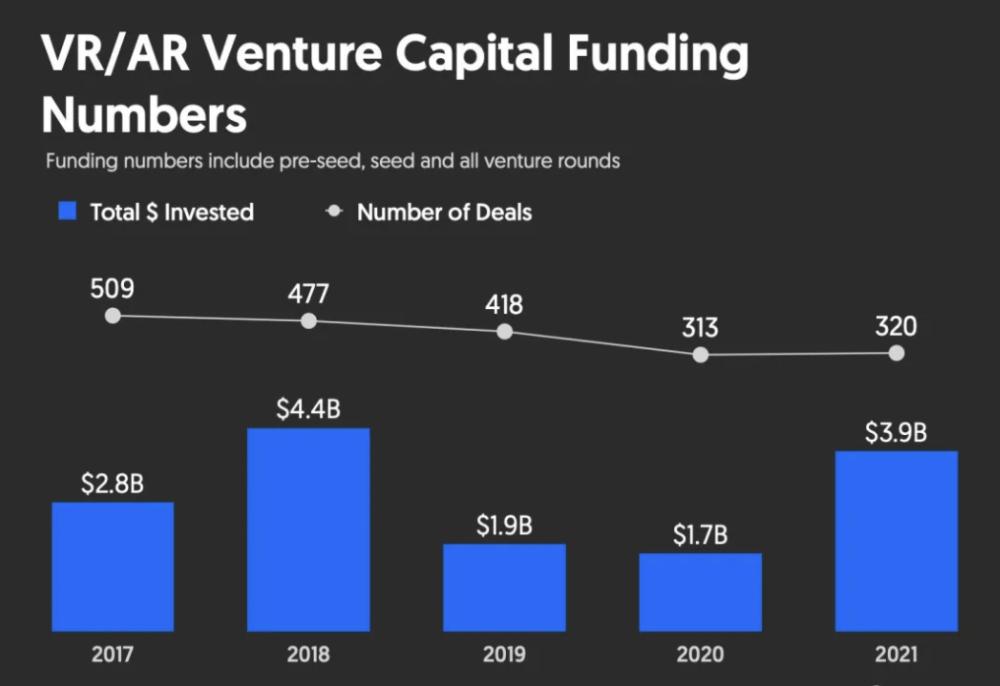Myung Min is from Ao Fei Temple
Qubits | Official account QbitAI
Attracting $1.9 billion (about RMB12 billion) in just one quarter, or half of the total financing for the year, AR/VR startups have really "won" lately.
According to Crunchbase News, in the fourth quarter of 2021, the amount of financing for AR/VR startups hit a record high.

△ Image source: crunchbase news
This makes 2021 the second-best year of investment ever made in vr/AR, with a full-year financing of US$3.9 billion (about RMB24.7 billion), second only to US$4.4 billion (approximately RMB27.8 billion) in 2018.
From the perspective of the average single transaction volume, the situation in 2021 is better than that in 2018, with an average single transaction value of about US$12.18 million (about 77.2 million yuan), exceeding the 9.22 million US dollars (about 58.44 million yuan) in 2018.
It is not difficult to see that the concept of a metaversic that exploded in 2021 has rekindled the investment community's interest in AR/VR.
What else is behind these numbers?
Let's take a look.
The "Facebook name change" triggered a wave of investment in the meta-universe
In fact, this year-end investment frenzy in the AR/VR industry is not untraceable.
Facebook's change of name to Meta at the end of October last year marked the beginning of a significant shift in investment vanes.
The CEO of startup Inworld AI said that when they raised money last July, investors also said that VR was no longer a topic of interest.
But in November, the company easily closed a $7 million seed round, while more people threw olive branches at them.
Coincidentally, ManageXR also had a bad financing before the meta-universe concept was launched, but in December it announced that it had won $4 million in financing, and the number of customers had grown from the original 30+ to more than 100.
A company like Magic Leap, which is well-known in the industry, raised $500 million in early October, the highest in nearly three years.
"Pokémon GO" developer Niantic completed a Series D funding round in November, receiving a $300 million investment from Tiger Fund Coatue, with a valuation of $9 billion.
Another notable funding comes from Naver Z, the operator of South Korean virtual social platforms, whose app ZEPETO allows users to design their own avatars, which ranked in the top 10 of APPStore China in October 2018.
At the same time, the financing of many domestic COMPANIES in the AR/VR field this year is also worthy of attention.
In July this year, Rokid officially announced the completion of a new round of investment, the scale of hundreds of millions of yuan;
In September, Liangfengtai announced the completion of a C+ round of financing of 270 million yuan, and in the same month, Nreal also announced the completion of a Series C financing of more than US$100 million (about 634 million yuan).
In addition, AR smart glasses optical module supplier Nederga also announced the completion of the B1 round of financing in June.
Technology giants have been laying out AR/VR for a long time
Unlike the first wave of AR/VR around 2015, this time the industry ushered in an outbreak in terms of technology, application and other aspects of the preparation is more sufficient.
For example, many companies create products that are more to B.
Take medical AR company AppliedVR, for example, which focuses on verticals and will provide VR-based treatments to patients. In November, they raised $36 million in Series B funding.
Representatives of its investors believe that AppliedVR has found a viable business model.
Magic Leap, which intends to launch a new generation of AR glasses this year, also looks at the field of medical AR and has cooperated with a number of medical institutions to use its new products for clinical research.
Some institutions say that the global market for AR/VR in healthcare will reach $18.7 billion by 2028.
And from the perspective of the entire industry, technology giants are also laying out AR/VR.
In recent years, Google, Apple, Microsoft, and Meta can be said to have won the "you die" on AR/VR headsets.
Meta's Oculus Quest 2 and Microsoft's HoloLens needless to say, each has developed a relatively stable market.
Apple, which is lagging behind in this track, has been rumored that it will launch its latest AR product this year, and recently poached Meta's former head of public relations for augmented reality projects.
After Google tried Project Glass in 2012, it was recently revealed that it was developing a new AR device, Project Iris, which is expected to be launched in 2024.
In terms of more specific applications, due to the impact of the epidemic, online meetings and online activities are becoming more and more common with the support of AR/VR technology.
For example, Facebook launched a VR telecommuting application before changing its name, which allows people to use avatars to meet with colleagues in the "metacosm".
Baidu has also held a conference on the VR platform "Xi'an", and the number of people online can reach 100,000.
Not only in terms of products, patents have also become an important embodiment of each company's preemptive position.
According to IPRdaily statistics from January 2020 to December 2021, the number of VR/AR-related invention patent applications published by IPRdaily shows that the number of patents in the AR/VR field of Samsung and Tencent has exceeded 4,000, ranking first and second in the list.
Baidu ranked third with 3,094 patents.
Sony, OPPO, Ping An Group, SenseTime, Canon, Huawei, and Microsoft ranked in the top 10.
In addition, Counterpoint predicts that the sales of AR/VR headsets will increase significantly this year, and the number of shipments will increase to 105 million units by 2025, which is 10 times the shipment volume in 2021.
△ Image source: Counterpoint
Reference Links:
[1]https://news.crunchbase.com/news/metaverse-augmented-reality-virtual-reality-investment/
[2]https://www.forbes.com/sites/jackkelly/2022/01/21/the-metaverse-set-off-a-battle-between-tech-giants-google-apple-microsoft-and-meta-to-build-virtual-and-augmented-reality-headsets/?sh=4a556ecc239c
[3]https://mp.weixin.qq.com/s/a3qlGyGu011uWPVThmInbg